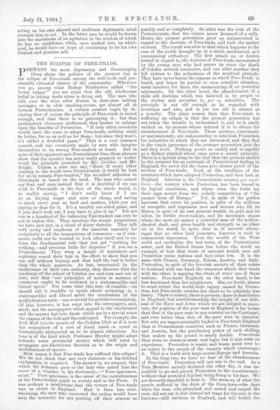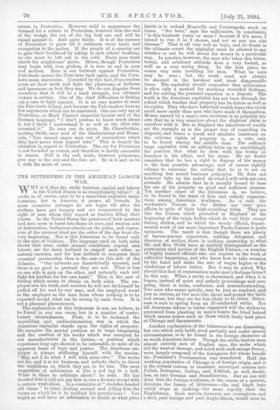THE ECLIPSE OF FREE-TRADE.
PERHAPS the most depressing and discouraging thing about the politics of the present day is the eclipse of Free-trade among the well-to-do and pre- sumably educated classes of the community. Wherever you go, among what Bishop Warburton called " the better vulgar " you see signs that the old, wholesome belief in letting trade alone is dying out. The men who talk over the wine after dinner, in first-class railway carriages, or in club smoking-rooms, are almost all at bottom Protectionists. A certain number begin by de- claring that of course the principle of Free-trade is sound enough, and that there is no gainsaying it ; but that perfunctory obeisance performed, they hasten to enlarge upon the benefits of Protection. "If only other countries would have the sense to adopt Free-trade, nothing could be better, for us as well as for them ; but since they won't, it's rather a doubtful game." That is a very common remark, and one constantly made by men who imagine themselves to be strong Free-traders at heart. But in spite of their apparent anti-Protectionist bias, these phrases show that the speaker has never really grasped or under- stood the principle preached by Mr. Cobden and Mr. Bright. Unless a man can say, "Even if every other country in the world were Protectionist, it would be best for us to remain Free-traders," his so-called adhesion to Free-trade is based on the sand. The man who cannot say that, and says instead that it is doubtful if we can slick to Free-trade in the face of the whole world, is in reality saying, " I don't really know if I can go on buying sugar and corn so cheap, and saving so much every year on beef and 'mutton, while you are paying so dear for it. It's a terribly one-sided game, and if you don't look out, I may have to give it up." Yet not one in a hundred of the balancing Fair-traders can ever be got to realise this. They envelope the simple proposition we have just put, in a cloud of misty rhetoric. They talk with pomp and emphasis of the essential necessity for reciprocity in all the transactions of commerce—as if com- merce could not be trusted to look after itself and to en- force the fundamental rule that you get "nothing for nothing,—and precious little for sixpence" if you are a Protectionist. They wrap a tangle of sentiment and sophistry round their legs in the effort to show that you can sell without buying, and that half the loaf is better than the whole quartern. At last, intoxicated by the exuberance of their own verbosity, they discover that the teachings of the school of Cobden are cast-iron and out of date, and that our principles of action in matters of commerce ought to be reviewed in a statesmanlike and liberal spirit.' For some time this sort of twaddle—we should call it twaddle to speak about reviewing in a statesmanlike and liberal spirit the conclusions of the multiplication table—was reserved for private consumption. Of late, however, it has crept into the newspapers, and, mark, not the newspapers which appeal to the uneducated and the masses but into those which are in a special sense the organs of the rich and the cultivated. For example, the Pall Mall Gazette speaks of the Cobden Club as if it were the respository of a sort of fossil creed—a creed so fantastically antiquated as to be almost ridiculous. Its tone is of the kind which Professor Huxley might adopt towards some provincial society which still tried to propagate pre-Darwinian theories as to the origin and modifications of species. How comes it that Free-trade has suffered this eclipse ? We do not think that any very elaborate or far-fetched explanation is required. The answer is, we suspect, that which Dr. Johnson gave to the lady who asked him the cause ,of a. blunder in his dictionary,—" Pure ignorance, in. am. Pure ignorance is the cause of the recrudescence of the Protectionist spirit in society and in the Press. It was perhaps a misfortune that the victory of Free-trade was so entire in England. Had it been less over- whelming, the men who converted the nation would have seen the necessity for not putting off their armour so quickly and so completely. So utter was the rout of the Protectionists, that the victors never dreamed of a rally. Hence, the present generation grew up uninstructed in regard to the doctrine of Free-trade, and took the matter on trust. The result was akin to that which happens in the case of the youth brought up in a strict, mechanical, and unreasoning orthodoxy. The first attack on, or doubts hinted in regard to, the doctrine of Free-trade encountered by the young men who had grown up since the death of Cobden seemed conclusive, and one after another they fell victims to the seductions of the sceptical attitude. They have never learnt the reasons on which Free-Trade is based, and hence its partial or even complete abandon- ment involves for them the surmounting of no powerful arguments. On the other hand, the abandonment of a stale old doctrine which was believed in by people in the sixties and seventies is, per se, attractive. The principle is not old enough to be regarded with reverence and awe, and is yet too old to attract as a novelty. The plain reason then that Free-trade is suffering an eclipse is that the present generation has not taken the trouble to understand it, and so is easily worked on by persons whose interest it is to obtain the abandonment of Free-trade. These persons, consciously or unconsciously, are endeavouring to establish Protection for industries in which they are interested, and they find. in the virgin ignorance of the younger generation just the soil they need. Nothing grows so rankly and so rapidly as a fallacy planted where once grew a sound principle. There is a special irony in the fact that the present should be the moment for an outbreak of Protectionist feeling in England, for never did the times give clearer proof of the wisdom of Free-trade. Look at the condition of the countries which have adopted Protection, and then look at England. America is the Protectionist country par excel- lence—the country where Protection has been forced to its logical conclusion, and where even the fowls lay their eggs secure from the unholy competition of "the pauper hens of Europe." Yet, in spite of the golden harvests that cover its prairies, in spite of the millions of energetic and ingenious men and women who fill its States, in spite of its vast mineral wealth, its gold and its silver, its fertile river-valleys, and its mountain slopes where the mere air makes a powerful man of the hollow. chested. clerk, and gives health and strength as no other air in the world, in spite, that is, of natural advan- tages that no other land possesses, America is sunk in commercial depression. Even the wealth of the West could not neutralise the last turns of the Protectionist screw, and the United States lies before the world an example of how that waste of national wealth men call Protection ruins nations and lays cities low. It is the same with France, Germany, Russia, Austria, and Italy. Protection, in spite of the feverish anxiety of their rulers to husband with one hand the resources which they waste with the other, is sapping the vitals of every one of these nations. Free-trade England, on the other hand, is far less depressed. than her neighbours. She, no doubt, shares to some extent the world-wide injury caused by Protec- tion, but Free-trade enables her share to be infinitely less heavy. There is misery, there is poverty, there is destitution in England, but notwithstanding the weight of our debt, and of the Navy and Army which we are obliged to main- tain, the position of the poor man in England is far better than that of the poor man in any country on the Continent, and even better than that of the poor man in America. Not only are wages nominally higher in Free-trade England than in Protectionist countries such as France, Germany, and Austria, but the purchasing power of each shilling that makes up the pound is nearly double. Free-trade then rests on common-sense and logic, but it also rests on experience. Protection is waste, and waste must ever b3 an injury to the people of the country which encouragei it. That is a truth writ large across Europe and America. In the long-run, we have no fear of the abandonment of Free-trade. Protection will not win in the end. As a Tory Member naively declared the other day, it was im- possible to go and preach Protection in the constituencie 4 without that wretched big loaf being flung in his face. We are devoutly thankful to hear it. The memory of what the people suffered in the days of the Corn-laws—the days when the man who ploughed and sowed and reaped the corn, did not eat it, but instead set traps for the rats in the furrows—still survives in England, and will forbid the return to Protection. However mild in appearance the demand for a return to Protection, however thin the end of the wedge, the cry of the big loaf can and will be raised against it. And quite fairly. It is of the essence of Protection to grow till it embraces every trade and occupation in the nation. If the people of a country are to gain their livelihood by taking in each others' washing, no one must be left out in the cold. Every man must starch his neighbours' shirts. Hence, though Protection may begin with iron girders, it is sure to end in corn and mutton. Here is our bulwark against Protection. Fair-trade means the Corn-laws back again, and the Corn. laws mean starvation. Consoled by this fact, Free-traders must set their teeth and fight the phantoms of dullness and ignorance as best they may. We do not disguise from ourselves that it will be a hard struggle, but ultimate victory is certain. One of the chief difficulties is finding out a case to fight against. It is no easy matter to meet the Fair-trade fallacy, just because the Fair-traders have so few arguments which can be combated. One can only say of Protection, as Mark Twain's immortal tourist said of the German language, " I don't profess to know much about it, but I think I understand it as well as the idiot who invented it." No man can do more. Mr. Chamberlain, quoting Swift, once said of the Gladstonians and Home- rule, "You cannot argue men out of convictions which they have never been argued into." This is largely the situation in regard to Protection. The cry for Protection is not founded on reason, and therefore is hardly amenable to reason. Still in the end, mists, however poisonous, give way to the sun and the free air. So is it and so be it with the mists of error.


































 Previous page
Previous page